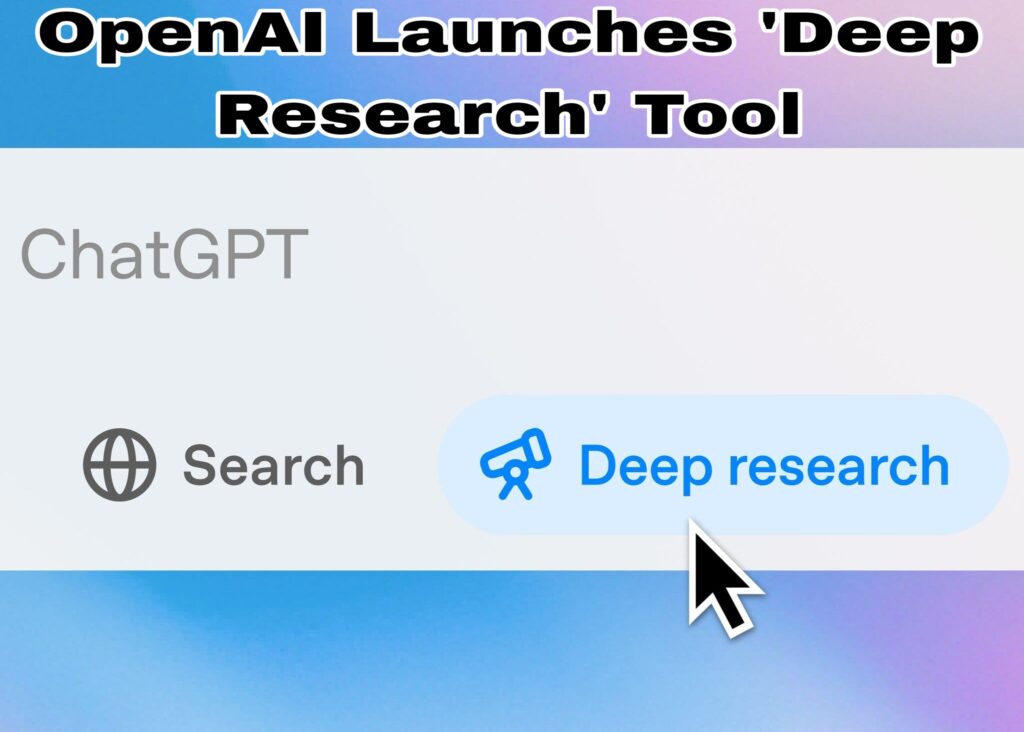Last Updated on February 3, 2025 by Muhammad Tabish
The artificial intelligence (AI) landscape is evolving at breakneck speed, and OpenAI is once again leading the charge. In a move that underscores its dominance in the AI race, OpenAI has launched its ‘Deep Research’ tool, a cutting-edge platform designed to tackle some of the most complex challenges in research and innovation. As tech giants like Google Deep Mind, Anthropic, and Meta ramp up their AI efforts, OpenAI’s latest offering is a clear signal that the competition is heating up.
But what exactly is the ‘Deep Research’ tool, and why is it generating so much buzz? More importantly, how can it benefit businesses, researchers, and tech enthusiasts? Let’s break it all down.
Contents
- 1 What is OpenAI’s ‘Deep Research’ Tool?
- 2 Why This Launch Matters in the AI Industry
- 3 Key Features of the ‘Deep Research’ Tool
- 4 Real-World Applications of the ‘Deep Research’ Tool
- 5 1. Healthcare and Drug Discovery
- 6 2. Climate Science and Sustainability
- 7 3. Finance and Investment
- 8 4. Technology and Innovation
- 9 Challenges and Ethical Considerations
- 10 The Future of AI-Driven Research
- 11 Final Thoughts
- 12 Share this:
What is OpenAI’s ‘Deep Research’ Tool?
OpenAI’s ‘Deep Research’ tool is an AI-powered research assistant built to handle highly specialized, data-intensive tasks. Unlike general-purpose AI models like ChatGPT, this tool is specifically designed for deep analytical work, making it ideal for industries that rely on complex data interpretation and hypothesis generation.
Powered by OpenAI’s advanced GPT architecture, the ‘Deep Research’ tool goes beyond surface-level analysis. It can process vast amounts of structured and unstructured data, identify patterns, generate insights, and even propose innovative solutions to intricate problems. Whether it’s accelerating drug discovery, predicting climate change impacts, or optimizing financial models, this tool is a game-changer.

Why This Launch Matters in the AI Industry
The AI industry is in the midst of an innovation arms race, with companies vying to develop the most powerful and versatile AI tools. OpenAI’s ‘Deep Research’ tool is a strategic move to stay ahead of the competition. Here’s why this launch is significant:
- Addressing a Growing Demand: As industries face increasingly complex challenges, the need for AI-driven solutions that can deliver actionable insights has never been greater.
- Specialization Over Generalization: While most AI tools focus on broad applications, the ‘Deep Research’ tool is tailored for research-intensive tasks, setting it apart from the competition.
- Ethical AI Development: OpenAI has emphasized transparency and ethical use, ensuring the tool is designed to benefit society while minimizing risks.
Key Features of the ‘Deep Research’ Tool
Here’s a closer look at what makes this tool a must-have for researchers and businesses:
- Advanced Data Analysis:
The tool can process text, images, and numerical data with unparalleled accuracy. It’s capable of identifying trends and patterns that might be invisible to the human eye. - Contextual Understanding:
Unlike traditional AI models, the ‘Deep Research’ tool understands the nuances and context of complex topics, making it ideal for fields like healthcare, climate science, and finance. - Hypothesis Generation:
One of its standout features is the ability to propose new hypotheses and research directions based on existing data. This can significantly accelerate the pace of innovation. - Seamless Integration:
The tool is designed to fit into existing workflows, enabling teams to collaborate more effectively without disrupting their processes. - Ethical Safeguards:
OpenAI has incorporated robust ethical guidelines to ensure the tool is used responsibly and transparently.
Real-World Applications of the ‘Deep Research’ Tool
The potential applications of this tool are vast and transformative. Here are a few examples:
1. Healthcare and Drug Discovery
The tool can analyze clinical trial data, identify potential drug candidates, and even predict patient outcomes. This could revolutionize the pharmaceutical industry by reducing the time and cost of bringing new drugs to market.
2. Climate Science and Sustainability
Researchers can use the tool to model climate change impacts, identify mitigation strategies, and optimize renewable energy solutions.
3. Finance and Investment
Financial institutions can leverage the tool for risk analysis, market forecasting, and portfolio optimization, giving them a competitive edge in a volatile market.
4. Technology and Innovation
From AI development to robotics, the tool can drive innovation by providing data-driven insights and proposing new research directions.
Challenges and Ethical Considerations
While the ‘Deep Research’ tool holds immense promise, it also raises important questions:
- Data Privacy: How can we ensure that sensitive data is handled securely?
- Misuse: What safeguards are in place to prevent the tool from being used for harmful purposes?
- Over-Reliance on AI: How do we strike a balance between AI-driven insights and human judgment?
OpenAI has addressed these concerns by embedding ethical guidelines into the tool’s design. However, the responsibility also lies with users to adopt this technology responsibly.
The Future of AI-Driven Research
OpenAI’s ‘Deep Research’ tool is more than just a technological breakthrough—it’s a glimpse into the future of AI. As industries and researchers embrace this tool, the possibilities for innovation are endless.
Don’t Miss: 5 Ways to Use DeepSeek AI for a Profitable Online Business
But the question remains: Are you ready to harness the power of AI for your business or research?
Unlock the Future of Research with OpenAI’s ‘Deep Research’ Tool!
Whether you’re a business leader, researcher, or tech enthusiast, this tool can transform the way you work. Explore its potential today and stay ahead in the AI revolution!
FAQs About OpenAI’s ‘Deep Research’ Tool
1. What industries can benefit from the ‘Deep Research’ tool?
The tool is versatile and can be used in healthcare, climate science, finance, technology, and more. Any field that requires deep data analysis and research can benefit.
2. How is this tool different from other AI models?
Unlike general-purpose AI models, the ‘Deep Research’ tool is specifically designed for complex, research-oriented tasks. It offers deeper analytical capabilities and contextual understanding.
3. Is the tool accessible to small businesses and individual researchers?
OpenAI has not yet released detailed pricing or accessibility information, but the company has a history of offering tiered plans to cater to different users.
4. What ethical safeguards are in place?
OpenAI has incorporated transparency, accountability, and ethical guidelines into the tool’s design to ensure responsible use.
5. Can the tool replace human researchers?
No, the tool is designed to augment human capabilities, not replace them. It handles data analysis and hypothesis generation, allowing researchers to focus on creativity and decision-making.
Final Thoughts
OpenAI’s ‘Deep Research’ tool is a testament to the rapid advancements in AI technology. As the competition heats up, tools like this will play a pivotal role in shaping industries, driving innovation, and solving some of humanity’s most pressing challenges.
Don’t get left behind—embrace the future of AI-driven research today! Read OpenAi Introducing Deep Search OpenAi Introducing Deep Search
I’m Mohammad Tabish Blogger and a Professional web developer SEO Consultant and Freelancer. I am from Pakistan. I started My first blog (BlogRankSeo) in 2016 and then, and I have never looked back. I Have managed lots of blogs.



